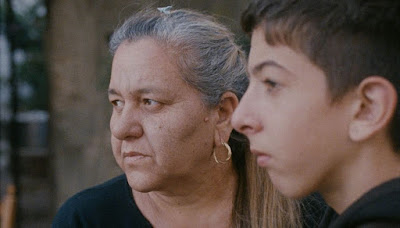Beginning with a look at the youthful criminal underworld of China (as it learns how to steal motorcycles), against a backdrop of the country's venal and stupid over-development of the housing market (one scene even takes place against a mural of a would-be new community gone bust), THE WILD GOOSE LAKE proves a consistently fascinating trip along the underbelly of the nation that has given us, among other things, Chairman Mao and the Corona Virus. As you might imagine, it ain't a pretty sight. It'll easily hold your attention, however.
The writer/director here is Diao Yinan (shown at right), who co-wrote the sweet, funny, moving Shower some 21 years ago. You could hardly ask for a more different movie -- in tone, genre, attitude and maturity -- than this new one, which you might call all about theft, drugs and rock-'n-roll (without much of the rock-'n-roll, though there is an oddball group dance number midway along).
One character here makes reference to "the Olympic Games of Theft," and while the theft is not up to that level, it certainly is an interesting example because, for quite awhile, we're not even certain what is being stolen let alone how and why. When we find out, the answer is pretty damned dark -- as befits a good neo-noir, which The Wild Goose Lake certainly is.
The film's style is to pile on flashback after flashback, sometimes within each other. Yet thanks to the filmmaker's smart sense of how to track time, place and event, he allows his audience to keep up surprisingly easily. Its main characters are the mid-level criminal, Zhou, played by Hu Ge, who is, as his name might suggest, a huge attraction in China. He's gorgeous, sexy, charismatic and not especially versatile, given that he offers up a variety of one and one-half expressions during the entire film. Never mind: he gets the job done.
After a surprise beheading of a young associate, Zhou (accidentally, he says) kills a cop and spends the remainder of the film being hunted down, even as he tries to re-bond with his woman Shujun (the delicate Wan Qian, above), while staying out of the clutches of the new girl in town (Gwei Lun-mei, below), the motives of whom remain ever just-out-of-reach.
The movie boasts one big action scene toward the beginning (below), and not really another until the climax, at which point the most ruthless perpetrator is finally revealed. However, that final action scene is so dense, bloody and brutal that it should knock you into submission, as well as knock your socks off. (It boasts the most original dual use of an umbrella that I can recall, and this is not merely as a weapon.)
By the denouement, The Wild Goose Lake finally offers its first glimmer of hope amidst near-total negativity. Up to then its portrait of low-end Chinese society is utterly damning. Trust is mentioned more than once in the movie, yet few we see deserve it. Ah, China -- the other equally hypocritical superpower, as Communism tries to go Capitalist! Good luck with that.
From Film Movement, running 111 minutes, and in Chinese with English subtitles, the movie opens tomorrow, Friday, March 6, in New York City at Film Forum, followed by a Los Angeles run at several Laemmle theaters and at the Alamo Drafthouse Downtown, beginning March 13. Here in Boca Raton, it will not open until April 17 at our Living Room Theaters. To view all currently scheduled playdates, cities and theaters, click here and scroll down.

































.jpg)
.jpg)
.jpg)
.jpg)




